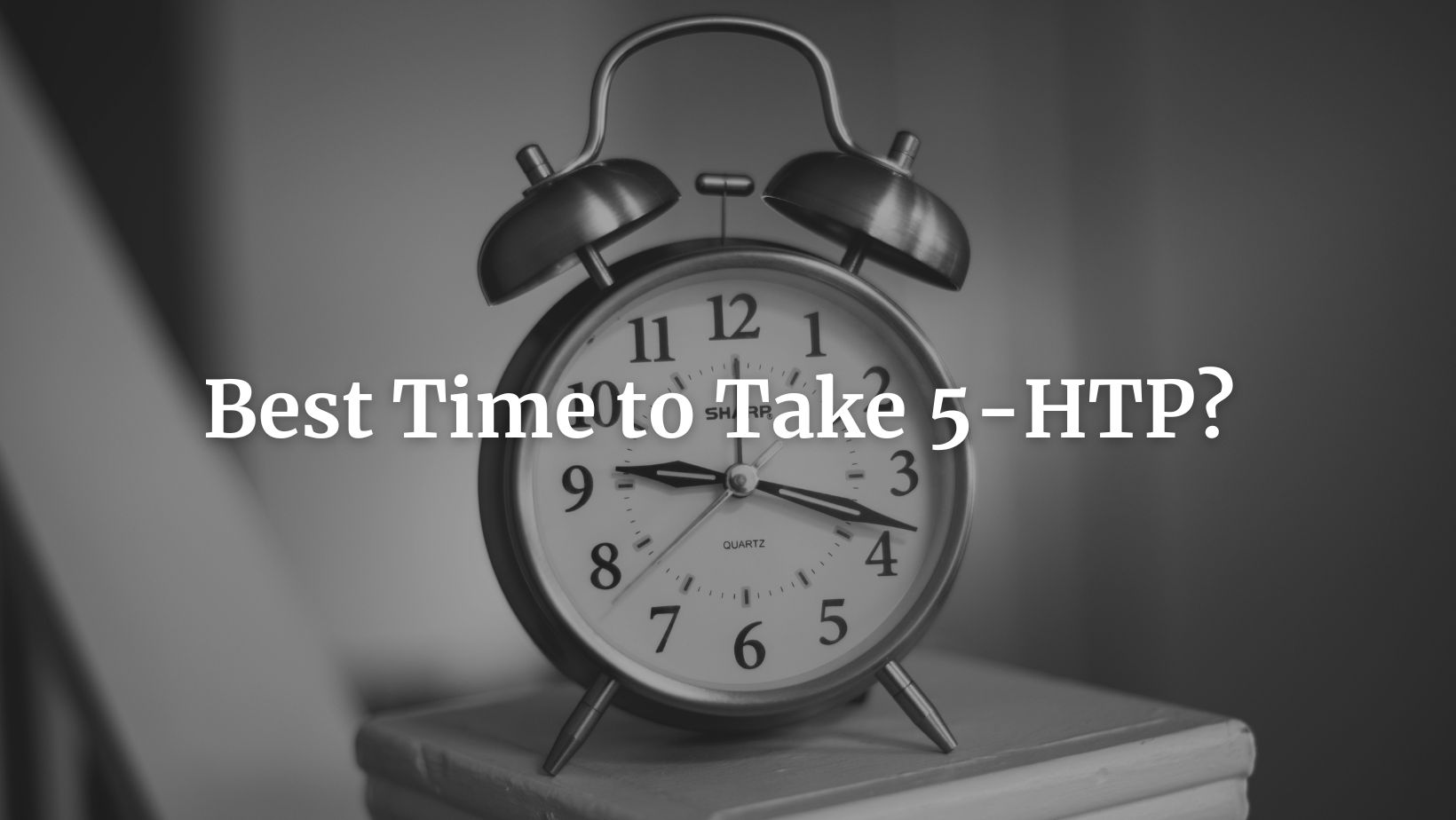Best Time to Take 5-HTP? Your Detailed Guide to the Serotonin Booster
So, you’re here to learn about the best time to take 5-HTP? I’ll tell you right away (but please, stick around to talk about the supplement itself, important safety precautions, and ways to make the most of it.)
The optimal time to take 5-HTP is above all when your healthcare provider recommends. This article isn’t medical advice so always take your doctor’s tips over what you learn here.
Still, based on what we know about taking 5-HTP, here’s how to take it:
- To boost your mood: Once in the morning and once in the afternoon (but stick to afternoon/before bedtime if it makes you drowsy
- To improve sleep quality: 30 minutes before bedtime
- For weight management: 30 minutes before meals
Warning: 5-HTP timing is only one part of the equation. It’s important to take the right dose – and have precautions in mind.
Read on to understand how the 5-HTP supplement works, why timing matters, what dosage to take, and how to make the most of it. Here’s what lies ahead:
Table of Contents
What is 5-HTP?
5-Hydroxytryptophan, or 5-HTP for short, is a chemical your body produces from tryptophan (an essential amino acid). In turn, 5-HTP turns into serotonin, a neurotransmitter – a chemical messenger that carries out communication between nerve cells.
Serotonin plays a pivotal role in regulating mood, sleep, and appetite. Low levels of this neurotransmitter have been linked to various health issues, including depression, anxiety, and sleep disorders.
Unfortunately, you can’t take serotonin directly because it can’t cross the blood-brain barrier (-> even if you took it, it wouldn’t end up in the brain where you need it). That’s why if you want to boost serotonin levels, you need an indirect way to impact them. SSRIs (the most popular type of anti-depressant right now) do this by blocking serotonin reuptake. 5-HTP aims to do it by giving your body more of the precursor to then turn into serotonin.
Unlike SSRIs, 5-HTP isn’t a medication, it’s a supplement. That’s because we don’t have enough evidence to prove they’re a safe and efficient treatment for any disease. We have some promising early results and plenty of anecdotal evidence. Still, 5-HTP can’t replace prescription medication so please don’t skip your prescribed therapy or delay seeing a doctor in favour of a supplement. I’m a broken record on this one, but, even though I’m a doctor, this is not medical advice – talk to your physician before introducing any supplement to your regimen.
Why Timing Matters
Even though 5-HTP is a supplement, it has an impact on your serotonin levels, which are highly dependent on the time of day. Knowing how long 5-HTP stays in your system – and how to take it to optimize its effects is essential when you start out.
The body’s internal clock, known as the circadian rhythm, governs various physiological processes, including the release of hormones and neurotransmitters like serotonin and melatonin. This is important for 5-HTP because it tells us when the supplement will be most effective & how we can avoid some unpleasant effects:
Circadian Rhythm and Neurotransmitters
The circadian rhythm is a 24-hour cycle that regulates various physiological processes, including sleep-wake patterns, body temperature, and hormone secretion.
Serotonin levels naturally fluctuate throughout the day – and, even more importantly, neurotransmitter itself impacts your circadian rhythm. Serotonin turns into melatonin in the pineal gland and melatonin is an important factor for you to fall asleep. This transformation is controlled by light (blue light in particular blocks it, which is good news in the morning but not so good when you want to fall asleep.)
Efficacy and Absorption
The timing of 5-HTP supplementation can also affect how well your body absorbs it and converts it into serotonin. For instance, taking 5-HTP on an empty stomach may facilitate quicker absorption, but it could also lead to gastrointestinal discomfort for some people. On the other hand, taking it with food might slow down absorption but could minimize potential side effects.
Condition-Specific Timing
The best time to take 5-HTP can also depend on the specific health condition you’re trying to address. For example:
- Depression: Since serotonin levels peak in the late morning, taking 5-HTP during the early morning or afternoon might be most effective.
- Insomnia: As melatonin levels rise in the evening, taking 5-HTP about 30 minutes before bedtime could help improve sleep quality.
- Weight Management: Taking 5-HTP before meals may help control appetite, as it can increase feelings of fullness.
By aligning the timing of your 5-HTP intake with your body’s natural circadian rhythm and specific health goals, you can maximize the supplement’s benefits while minimizing potential side effects.
Benefits of 5-HTP
5-HTP has garnered attention for its potential to improve various aspects of health. Now that we discussed some of the most important aspects of timing it, let’s talk about the key benefits, supported by scientific evidence.
Depression
Serotonin imbalance is often implicated in mood disorders like depression. 5-HTP has shown promise in elevating serotonin levels, thereby potentially improving mood. Some studies indicate that the supplement may be particularly effective when used in combination with other substances or antidepressant medications. However taking an antidepressant and 5-HTP can also raise your serotonin levels to a dangerous level (also known as serotonin syndrome) so this is not a combination you should attempt alone.
Insomnia
5-HTP can be converted into melatonin, a hormone that regulates sleep. Research suggests that taking 5-HTP before bedtime may reduce the time it takes to fall asleep and improve overall sleep quality. The effect appears to be enhanced when 5-HTP is combined with gamma-aminobutyric acid (GABA), another chemical messenger that promotes relaxation.
Weight Loss
5-HTP may help control appetite by increasing feelings of fullness. In certain studies, individuals who took 5-HTP consumed fewer calories and reported less hunger than those who didn’t. This effect seems to be particularly beneficial for weight management, as it may counteract hormones that induce hunger.
Fibromyalgia
Fibromyalgia is characterized by widespread muscle and joint pain, fatigue, and cognitive difficulties. While the exact cause is unknown, low serotonin levels have been associated with the condition. Some evidence suggests that 5-HTP may alleviate symptoms like muscle pain, sleep problems, and anxiety.
Migraines
Low serotonin levels are also thought to play a role in migraines. 5-HTP has been studied for its potential to reduce the frequency and severity of migraine attacks. Some research indicates that the supplement may be as effective as certain migraine medications when taken regularly.
Each of these benefits is backed by varying degrees of scientific evidence, and it’s essential to consult a healthcare provider for personalized advice, especially if you’re considering combining 5-HTP with other medications.
Dosage Guidelines
Understanding the correct dosage of 5-HTP is vital for maximizing its benefits while minimizing potential side effects. Here are some general guidelines based on different health conditions:
Recommended Dosages
- Depression: Starting with 50 mg twice daily and consulting a healthcare provider for adjustments is advisable.
- Insomnia: A lower initial dose of 50 mg before bedtime, gradually increasing to 100–300 mg as needed, can be effective.
- Weight Loss: 250–300 mg taken 30 minutes prior to each meal may help control appetite.
- Fibromyalgia: A typical dosage is 100 mg, 3–4 times per day with meals. It’s recommended to start with a lower dose and gradually increase.
- Migraines: A daily dose of 600 mg has been used in studies, but it’s crucial to consult a healthcare provider for personalized advice.
Dosage and Timing Interplay
The dosage can also influence the best time to take the supplement. For example, higher doses may have a more pronounced effect but could also lead to more significant side effects. Therefore, aligning the dosage with the timing can help you achieve the desired outcomes more effectively.
Side Effects and Precautions
While 5-HTP is generally well-tolerated, some people may experience side effects like nausea, diarrhea, and stomach pain. These side effects are often dose-dependent, meaning they may worsen with higher doses. Always start with the lowest effective dose and consult a healthcare provider for any adjustments.
It’s also essential to be cautious when combining 5-HTP with other medications, especially those that affect serotonin levels, as this could lead to serotonin syndrome—a potentially life-threatening condition (that we’ll talk about in a bit in more detail).
Optimal Timing for Different Conditions
Knowing when to take 5-HTP can be as important as knowing why to take it. The timing can vary depending on the health condition you aim to address. Here’s a breakdown:
Best Time for Depression
Serotonin levels are generally higher during the daytime, peaking in late morning or early afternoon. Therefore, taking 5-HTP during these times may offer the most benefit for elevating mood. Some individuals also find it helpful to split the dosage, taking half in the morning and half in the early afternoon to maintain stable serotonin levels throughout the day.
Best Time for Insomnia
Melatonin, the sleep hormone, starts to rise in the evening. Since 5-HTP is a precursor to melatonin, taking it about 30 minutes before bedtime can help improve sleep quality. It’s advisable to start with a lower dose and gradually increase it to minimize potential side effects like nausea.
Best Time for Weight Loss
5-HTP can increase feelings of fullness, which may help you eat less and lose weight. Taking the supplement about 30 minutes before meals can maximize this effect, making you less likely to overeat.
Best Time for Fibromyalgia
For those dealing with fibromyalgia, a condition often linked to low serotonin levels, taking 5-HTP throughout the day in divided doses may help manage symptoms like pain and fatigue. Consult your healthcare provider for a tailored dosage schedule.
Best Time for Migraines
If you’re prone to migraines, consider taking 5-HTP as a preventive measure. Some studies suggest that regular supplementation can reduce the frequency of migraine attacks. The timing, in this case, may be less critical, but consistency is key.
It’s crucial to note that these recommendations are based on existing research and general guidelines. Individual responses to 5-HTP can vary, and it’s always best to consult a healthcare provider for personalized advice.
Side Effects and Safety Concerns
While 5-HTP is generally considered safe when taken in moderate doses, it’s essential to be aware of potential side effects and safety concerns.
Common Side Effects
- Nausea: This is one of the most commonly reported side effects and is often dose-dependent.
- Diarrhea: Some individuals may experience gastrointestinal issues, particularly when starting the supplement.
- Stomach Pain: This can occur, especially when taking 5-HTP on an empty stomach.
Drug Interactions
5-HTP can interact with various medications, including but not limited to:
- Antidepressants
- Anti-anxiety medications (in fact, any mental health medication you are on might interact with the 5-HTP)
- Sleep aids (even OTC supplements like melatonin)
- Certain pain medications
If you’re taking any of these medications, consult your healthcare provider before starting 5-HTP to avoid potential interactions.
Serotonin Syndrome Warning
Serotonin syndrome is a serious medical condition that can occur when levels of serotonin become too high. Learn more about recognising and preventing it in this quick video:
Symptoms include confusion, rapid heart rate, and high blood pressure. While rare on supplements like 5-HTP , it’s crucial to be aware of this risk. It’s also the reason why you shouldn’t drink alcohol or take antidepressants with 5-HTP – these two things will also boost serotonin and could increase your risk.
Conclusion
And there you have it – we’ve explored the various facets of 5-HTP, from its benefits and optimal timing to dosage guidelines and safety concerns. In some cases, 5-HTP’s effectiveness y when you take it, how much you take, and for what purpose.
Remember, while 5-HTP has shown promise in treating a range of conditions, you shouldn’t skip talking to your healthcare provider (emphasis on your because they’re the one to give you personalized advice, especially if you’re considering combining it with other medications or have a pre-existing medical condition.)
Stay healthy and remember to come back to Supplement Rex for even more science-backed supplement pieces!
What time of day should I take 5-HTP?
The best time to take 5-HTP depends on your specific health goals:
For depression: Early morning or afternoon is generally recommended to align with your body’s natural serotonin rhythm.
For insomnia: About 30 minutes before bedtime to help increase melatonin levels.
For weight loss: Approximately 30 minutes before meals to maximize its appetite-suppressing effects.
Does 5-HTP make you sleepy during the day?
5-HTP itself is not a sedative, but it is a precursor to serotonin, which can be converted into melatonin, the sleep hormone. Some people prefer to take it during the day for conditions like depression or fibromyalgia and don’t get sleepy – others stick to taking it at night. Still, until you’re sure it doesn’t make you drowsy, avoid taking it before driving or operating heavy machinery
How many hours does 5-HTP last?
The duration of 5-HTP’s effects can vary depending on several factors, including the dosage and your individual metabolism. Generally, its effects last for about 3 to 6 hours – but “budget” a bit longer than that when you first start taking the supplement.
Why does 5-HTP make you sleepy?
5-HTP can be converted into melatonin, a hormone that regulates sleep. When taken in the evening or before bedtime, it may increase melatonin levels, thereby promoting relaxation and sleep. It’s not that 5-HTP itself makes you sleepy, but rather its conversion into melatonin can facilitate sleep. And, this doesn’t happen to everybody, either. If you’re worried about drowsiness, start taking the supplement in the evening and watch how your system respond.



![What Is the Best Sulforaphane Supplement? [2023 In-Depth Guide]](https://supplementrex.com/wp-content/uploads/2023/06/6-768x433.jpg)



